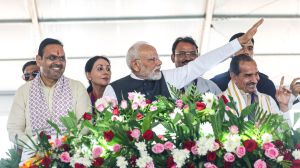Bush’s historic talks offer betrays few options left to him
After 27 years in which the US has refused substantive talks with Iran, President George W Bush reversed course on Wednesday because it was made clear to him by his allies, by the Russians, by the Chinese, and eventually by some of his advisers that he no longer had a choice.

After 27 years in which the US has refused substantive talks with Iran, President George W Bush reversed course on Wednesday because it was made clear to him by his allies, by the Russians, by the Chinese, and eventually by some of his advisers that he no longer had a choice.
During the past month, according to European officials and some US officials, it became obvious to Bush that he could not hope to hold together a fractious coalition of nations to enforce sanctions—or consider military strikes on Iranian nuclear sites—unless he first showed a willingness to engage Iran’s leadership directly over its nuclear programme and exhaust every non-military option.
Few of his aides expect that Iran’s leaders will meet Bush’s main condition: that Iran first re-suspend all of its nuclear activities, including shutting down every centrifuge that could add to its small stockpile of enriched uranium. And while the Europeans and the Japanese said they were elated by Bush’s turnaround, some participants in the drawn-out nuclear drama questioned whether this was an offer intended to fail, devised to show the extent of Iran’s intransigence.
Bush, according to one participant in those debates, told Secretary of State Condoleezza Rice several months ago that he needed ‘‘a third option’’, a way to get beyond either a nuclear Iran or an American military action. Rice spent a long weekend in early May drafting a proposal that included a timetable for diplomatic choreography through the summer.
There was strong opposition from the White House, particularly from Vice- President Dick Cheney, according to several former officials. ‘‘Cheney was dead set against it,’’ said one former official who sat in many of those meetings. ‘‘At its heart, this was an argument about whether you could isolate the Iranians enough to force some kind of regime change.’’
In the end, said one former official who has kept close tabs on the debate, ‘‘it came down to convincing Cheney and others that if we are going to confront Iran, we first have to check off the box’’ of trying talks. Bush offered a more positive-sounding account: ‘‘I thought it was important for the United States to take the lead, along with our partners, and that’s what you’re seeing. You’re seeing robust diplomacy.’’
The question now is whether there is any middle ground between President Bush’s demand that Iran give up everything, and Iran’s insistence that it will give up nothing. Without breaking that logjam, the American-Iranian dialogue may never begin.DAVID E SANGER




- 01
- 02
- 03
- 04
- 05


























